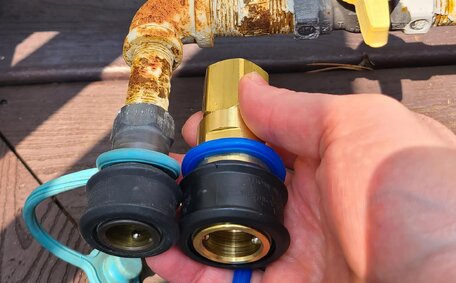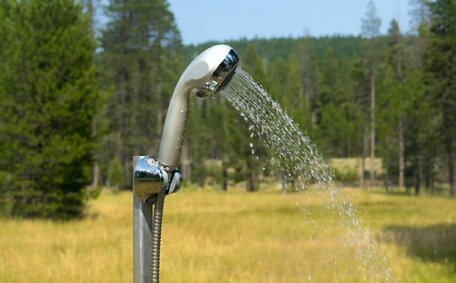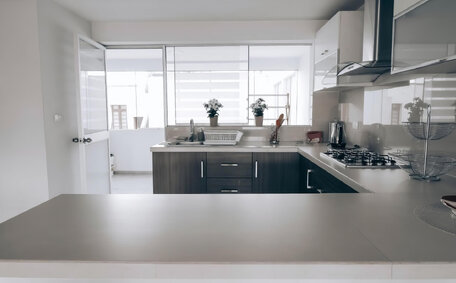The Risks of Clogged Drains in Restaurants
Addressing plumbing problems with regular restaurant drain cleaning is crucial to prevent clogged drains, which can severely impact your restaurant in Gladesville, Sydney, by disrupting service, posing health risks, and potentially leading to property damage. Considering how much grease, oil, fat, and food scraps build up in pipes over time, they dry out P-traps and restrict water flow.
Flooded kitchens, especially a kitchen floor around your bar sinks, can lead to a clogged drain, compromising food safety and ensuring your employees are safe from the risks of slips, falls, and electric shocks. This can lead to foul odours, backups, and even raw sewage contaminating the dining area. This can lead to foul odours, backups, and even raw sewage contaminating the dining area.
Installing Drain Covers and Screens
To manage your commercial drain requirements in restaurant kitchens in Gladesville, Sydney, install drain covers and screens - a measure that can help your establishment maintain proper sanitation. Fine screens should also be used in sinks and disposals for keeping your sink clear by catching smaller particles before they head down the drains.
Drain covers fit over sink drains and floor drains, featuring a wire mesh or perforated metal to catch large food particles like produce scraps, bones, and other debris before they wash down sink pipes.
Trap cleaning should be done frequently on drain covers to remove trapped debris such as used cooking oil. The screens help keep your drains free of oils grease, fats, and solids that can clog and accumulate in the system, potentially hardening and resulting in blockages. Keeping this waste out of the pipes is key as over time it can build up, restrict water flow, and lead to backups and overflows.
As part of a restaurant’s comprehensive cleaning routine, Learning about restaurant drain maintenance helps to not give up, reinforcing proper disposal habits. When paired with keeping drains clean, grease trap maintenance, and staff training, they help prevent issues like foul odours and health code violations caused by clogged drains. Installing these barriers can prevent disruptions and is essential for efficient operations.
Proper Grease Trap Use and Maintenance
Grease traps are essential pieces of equipment in drains your kitchen to capture fats, oils, and grease (FOGs) before they can enter sewers and cause blockages. To maximise the effectiveness of your grease trap, staff should scrape paper towels and food remnants directly into the garbage before rinsing to minimise excess grease entering the system.
How do I maintain off the charts restaurant cleaning standards in my commercial kitchen? Ensure your staff is diligent in performing cleaning maintenance, including grease trap cleaning, by clearing accumulated waste from your drain’s traps daily.
A thorough cleaning of your grease traps and ensuring the drain pipe is clear at least once a week is crucial. Your Your staff should make sure to remove the lid and manually scrape out any amount of grease that has hardened to clean your grease trap thoroughly. After scrubbing, flush your drain grease trap with boiling water and dish soap to help breakdown the residue, then rinse it clean. Neglected grease traps can corrode, crack, and leak hazardous waste into the soil and compromise your restaurant’s drain system.
The remaining liquid waste from your restaurant drain should then be scooped out and disposed of appropriately, avoiding direct contact for health and safety reasons.
Failing to regularly clean grease traps can cause a dangerous build up of hydrogen sulphide gas. Improper practices, like pouring bleach or harsh chemicals down the drains, are among the most common issues that can damage traps and jeopardise your plumbing system, affecting your guests and your business. Educating kitchen staff and maintaining strict cleaning procedures is key to get your systems to provide the most value.
Cleaning Sink Strainers
Restaurant staff in Gladesville should integrate the cleaning of sink strainers into your daily closing duties. Start by removing the strainer basket and disposing of any food debris in the garbage.
Rinse the sink strainer basket thoroughly under running hot water to dissolve and remove grease. Use a stiff brush or scrub pad to dislodge any remaining particles, such as hair or soap residue.
Place the strainer basket in a sink filled with hot water and 2 cups of baking soda. Allow it to soak for 15 minutes before scrubbing again with a brush. Place the strainer basket in a sink filled with hot water and 2 cups of baking soda.
Rinse and replace back in the sink drain. Repeat the soaking process weekly using hot water and vinegar to deodorise.
Maintaining clean sink strainers is crucial for your restaurant’s operations to ensure water drains freely and to prevent food backup in the sink itself. Clogged strainers can also lead to slower water flow, resulting in standing water that violates health codes. When combined with other preventative measures like drain screens and grease traps, combating the small daily clogs can help restaurant drains operate optimally.
Using Enzyme Cleaners
Enzyme drain cleaners are an eco-friendly garbage disposal choice, ideal for keeping waste moving through your restaurant drains clear and free-flowing. Unlike harsh chemicals, enzyme cleaners use bacteria and natural enzymes to break down and dissolve organic waste buildup including oils fats. They digest grease, fats oils, starches, proteins, and cellulose, ensuring that these substances can become easily managed within your pipes, keeping them clear of clogs and preventing foul odours.
Pouring just a few ounces of enzyme cleaner down all your sinks and floor drains weekly keeps waste from accumulating and sticking to drain pipes’ walls.
Enzymes break this waste into liquid form, allowing it to clear your drains and flush pipes freely rather than causing them to back up. Safe for plumbing and the environment, these cleaners won’t corrode pipes or pollute waterways.
Using enzyme cleaners is ideal for older restaurants wanting to avoid expensive pipe repairs.
By continually breaking down organic matter, they allow drains to operate optimally. Workers should pour solutions down each drain weekly as part of closing tasks. By continually breaking down organic matter, they allow drains to operate optimally.
Developing Preventative Maintenance Plans
Developing a comprehensive plan where maintenance can help keep your restaurants’ plumbing in Gladesville running efficiently is crucial. This involves establishing routine drain cleaning and maintenance for the kitchen sink, carried out by staff, as well as utilising professional services.
When comes to kitchen maintenance, staff should often be reminded and trained on tasks such as scraping food remnants from food preparation into bins. Clear protocols reinforce good habits.
Like their counterparts in New York, restaurants should maintain consistent water pressure by adhering to a cleaning schedule that includes line jetting, also known as professional hydro jetting, every 3 months to clear any hardened buildup. Grease trap cleaning should be conducted by specialists quarterly. Annual drain line inspections using cameras check for damage needing repair.
Implementing these measures is one most effective way to prevent plumbing challenges such as blockages and backups caused by the accumulation of fats, oils, and grease. Keeping drains clear means fewer emergencies, lower risks to health codes, and uninterrupted service essential for excellent customer experiences.
Routine maintenance, including checks of gas lines, paired with professional servicing, ensures restaurant plumbing is always running smoothly, averting costly repairs later on. Preventative care can take the burden off staff so they can focus fully on food quality and dining enjoyment.
Staff Training on Drain Best Practices
Training your employees in Gladesville on how to use drain fixtures and perform care is crucial to mitigate plumbing issues. Employees should learn how to avoid pouring oil down drains, scrape food waste into bins, monitor grease traps, and use enzyme cleaners. Explaining these best practises reduces the need to call a plumber frequently as it helps minimise blockages and ensures drains operate smoothly.
Staff training should cover:
- Scraping plates/pots before washing to keep food/grease out of drains
- Using drain grates and screens to catch debris
- Checking sinks for blockages before use
- Reporting any foul odours immediately
- Following instructions for grease trap maintenance
- Pouring enzyme cleaners weekly as preventative measure
Consistent training ensures staff habits align with best practises for commercial drain maintenance. Preventing even minor buildup helps avoid major pipe damage, backflows, health code violations, and service disruptions down the line. Equipped with proper knowledge, employees can keep drains clear through daily tasks so restaurants operate smoothly.
Scheduling Regular Drain Inspections and Cleanings
The first step to prevent drain disasters in restaurants is to schedule professional drain cleaning services and inspections every 3 months. Technicians use tools like a plumbing snake, high-pressure water jets, and advanced cameras to thoroughly clean pipes and identify issues. They can also assess grease trap operation and test for leakage.
Regular servicing includes having your team examine the water heater to remove any built-up debris, keeping water flowing freely through the commercial plumbing drainage system. It also allows specialists to detect minor problems early before they worsen into major headaches. Fixing small pipe cracks is far less disruptive and expensive than replacing whole sections.
quarterly cleaning appointments, restaurants should request annual drain line inspections to check pipe integrity. Any damaged sections can then be repaired strategically during slower business periods to minimise service impacts.
By engaging your local cleaning services for drain lines and plumbing services like Gladesville Plumbing, businesses invest in their infrastructure’s longevity and adopt a preventative approach to maintenance. Proactive steps ensure optimal drain function, helping avoid emergency callouts and potential health code violations down the track.
Installing Commercial Dishwashers
For any commercial kitchen, dishwashers serve as an essential preventative measure, aiming to limit food waste from clogging the drains in Gladesville’s vibrant restaurant scene. Commercial models are specially designed for high-volume dish cleaning and sanitising while protecting the kitchen drain from drainage issues.
The powerful wash action ensures that any debris captured does not end up where the drain can become clogged, while the built-in scrap trays and self-cleaning filtration system deal with wash water. Models certified by major bodies like NSF International meet strict standards that food particles and waste water are captured and contained within garbage disposals, not sent into public sewer systems.
Features such as built-in booster heaters ensure hot wash and rinse cycles, which help to dissolve grease oil components, thereby preventing potential drain clogs and sanitizing dishes hygienically. The high heat dries them rapidly as well, boosting workflow. Many machines automatically dispense the optimal amount of detergent too.
Staff should be trained to fully empty scraps and load racks correctly prior to each wash cycle. Following the manufacturer instructions for loading, cleaning filters, and maintenance keeps commercial dishwashers working effectively for years.
Commercial dishwashers are a worthwhile investment, outperforming any other cleaning methods for maintaining health standards and keeping kitchen drains free from blockages. Their supreme cleaning power saves labour costs over hand washing while their designed containment measures keep food and oils from building up in drains.






